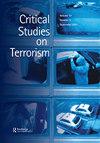Counter-terrorism laws and freedom of expression: global perspectives
IF 2.5
Q2 POLITICAL SCIENCE
引用次数: 0
Abstract
The editors open the first chapter of this book with a catchy heading: “Uncertain Times for Freedom of Expression”. Indeed, we can see the tendency for freedom of expression to be sacrificed for assumed security, stability, and safety. Counter-terrorism Law and Freedom of Expression challenges such attitudes, presenting well-researched and meticulously laid out case studies of countries and counterterrorism approaches that make the reader wonder if the sacrifice we make to feel safe is too great. The book starts with a necessary discussion of the definitional problems of terrorism and goes on to present various legal approaches to counterterrorism envisioned and enacted around the world. Counter-terrorism Law and Freedom of Expression goes further in its arguments than some preceding scholarships, as the authors argue that terrorism can (and should) be seen as communication. Workneh and Haridakis see terrorism as “an act performed, consumed, and conducted primarily through mediated com-munication” (11). This approach allows the authors to employ a constructivist take on terrorism, adding to the growing body of critical security literature. The book represents a methodically curated account of global perspectives on counterterrorism laws and freedom of expression that impact journalism, political activism and dissent, and citizenry in different political systems. The book will be of particular interest to scholars seeking to broaden their knowledge of counterterrorism legislation and their respec-tive problems around the world, especially in non-Western settings. The editors have chosen to be transparent in reflecting on biases in terrorism and counterterrorism studies, as well as in the field of media and communication, by challenging the mainstream counterterrorism scholarship and dominant western approaches, which makes this a refreshing read. The reader will find the book taking a critical look at several fundamental concepts of counterterrorism, such as national security, the nature of the terrorist threat, and the process of creating and maintaining marginalised communities as part of the counterterrorism agenda.反恐法和言论自由:全球视角
编辑们用一个吸引人的标题打开了这本书的第一章:“言论自由的不确定时代”。事实上,我们可以看到言论自由被牺牲的趋势,以换取所谓的安全、稳定和安全。《反恐怖主义法》和《言论自由》挑战了这种态度,通过对国家和反恐方法进行充分研究和精心布置的案例研究,让读者怀疑我们为了感到安全而做出的牺牲是否太大了。这本书从对恐怖主义的定义问题的必要讨论开始,接着介绍了世界各地设想和制定的各种反恐法律途径。《反恐怖主义法与言论自由》的论点比之前的一些奖学金更深入,因为作者认为恐怖主义可以(也应该)被视为一种交流。Workneh和Haridakis将恐怖主义视为“一种主要通过中介沟通进行、消费和实施的行为”(11)。这种方法允许作者采用建构主义的视角来看待恐怖主义,为日益增长的批判性安全文献增添新的内容。这本书是对反恐法律和言论自由的全球视角的系统策划,这些法律和言论自由影响着新闻业、政治激进主义和异议,以及不同政治制度下的公民。这本书将特别感兴趣的学者寻求扩大他们的反恐立法知识和各自的问题在世界各地,特别是在非西方设置。编辑们选择通过挑战主流反恐学术和占主导地位的西方方法,透明地反映恐怖主义和反恐研究中的偏见,以及媒体和传播领域的偏见,这使本书成为一本令人耳目一新的读物。读者会发现这本书对反恐的几个基本概念进行了批判性的审视,比如国家安全,恐怖主义威胁的本质,以及作为反恐议程一部分的创建和维护边缘化社区的过程。
本文章由计算机程序翻译,如有差异,请以英文原文为准。
求助全文
约1分钟内获得全文
求助全文

 求助内容:
求助内容: 应助结果提醒方式:
应助结果提醒方式:


